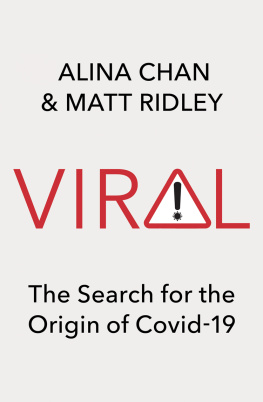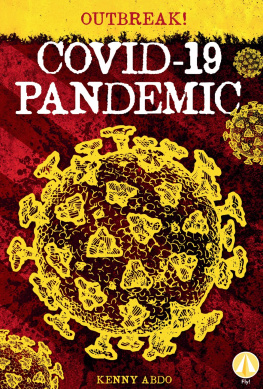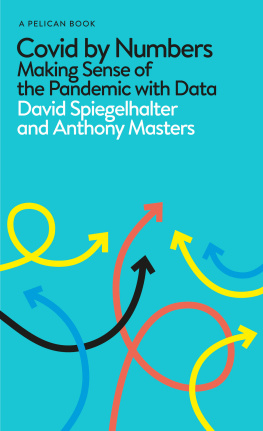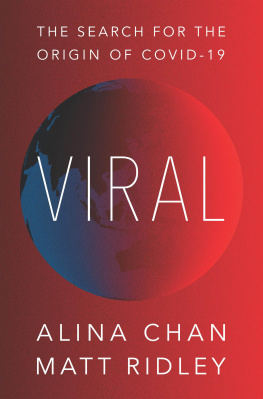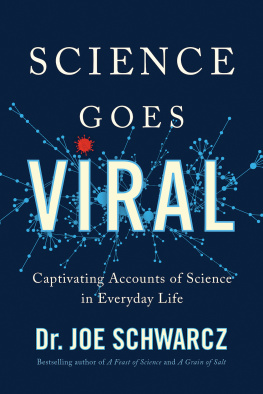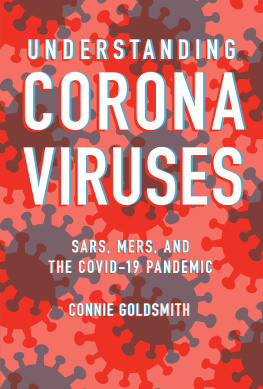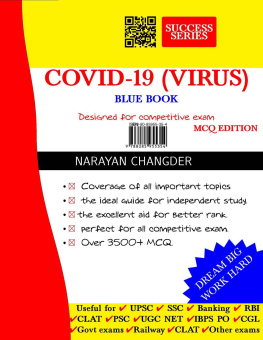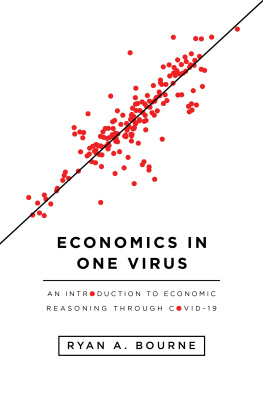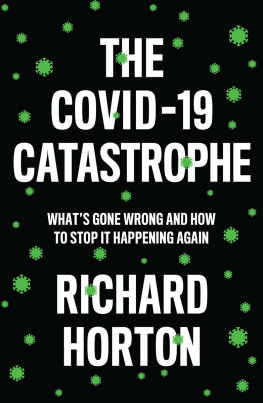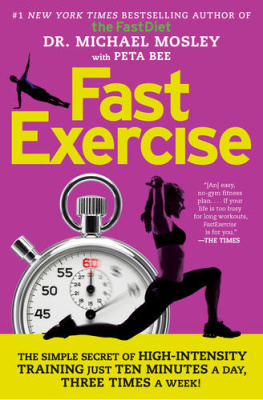Alina Chan - Viral: The Search for the Origin of Covid-19
Here you can read online Alina Chan - Viral: The Search for the Origin of Covid-19 full text of the book (entire story) in english for free. Download pdf and epub, get meaning, cover and reviews about this ebook. year: 2021, publisher: HarperCollins UK, genre: Detective and thriller. Description of the work, (preface) as well as reviews are available. Best literature library LitArk.com created for fans of good reading and offers a wide selection of genres:
Romance novel
Science fiction
Adventure
Detective
Science
History
Home and family
Prose
Art
Politics
Computer
Non-fiction
Religion
Business
Children
Humor
Choose a favorite category and find really read worthwhile books. Enjoy immersion in the world of imagination, feel the emotions of the characters or learn something new for yourself, make an fascinating discovery.
- Book:Viral: The Search for the Origin of Covid-19
- Author:
- Publisher:HarperCollins UK
- Genre:
- Year:2021
- Rating:3 / 5
- Favourites:Add to favourites
- Your mark:
- 60
- 1
- 2
- 3
- 4
- 5
Viral: The Search for the Origin of Covid-19: summary, description and annotation
We offer to read an annotation, description, summary or preface (depends on what the author of the book "Viral: The Search for the Origin of Covid-19" wrote himself). If you haven't found the necessary information about the book — write in the comments, we will try to find it.
Viral: The Search for the Origin of Covid-19 — read online for free the complete book (whole text) full work
Below is the text of the book, divided by pages. System saving the place of the last page read, allows you to conveniently read the book "Viral: The Search for the Origin of Covid-19" online for free, without having to search again every time where you left off. Put a bookmark, and you can go to the page where you finished reading at any time.
Font size:
Interval:
Bookmark:

4th Estate
An imprint of HarperCollinsPublishers
1 London Bridge Street
London SE1 9GF
www.4thEstate.co.uk
HarperCollinsPublishers
1st Floor, Watermarque Building, Ringsend Road
Dublin 4, Ireland
This eBook first published in Great Britain by 4th Estate in 2021
Copyright Alina Chan and Matt Ridley 2021
Cover design by Steve Leard
Alina Chan and Matt Ridley assert the moral right to be identified as the authors of this work
A catalogue record of this book is available from the British Library
Maps and diagrams by Martin Brown
All rights reserved under International and Pan-American Copyright Conventions. By payment of the required fees, you have been granted the non-exclusive, non-transferable right to access and read the text of this e-book on-screen. No part of this text may be reproduced, transmitted, down-loaded, decompiled, reverse engineered, or stored in or introduced into any information storage and retrieval system, in any form or by any means, whether electronic or mechanical, now known or hereinafter invented, without the express written permission of HarperCollins.
Source ISBN: 9780008487492
Ebook Edition November 2021 ISBN: 9780008487515
Version: 2021-09-24
For the people who have suffered and lost during the Covid-19 pandemic, those who have cared for and provided aid to others during the pandemic, and those brave whistleblowers, doctors, scientists, journalists and sleuths who have persisted in seeking and sharing the truth.

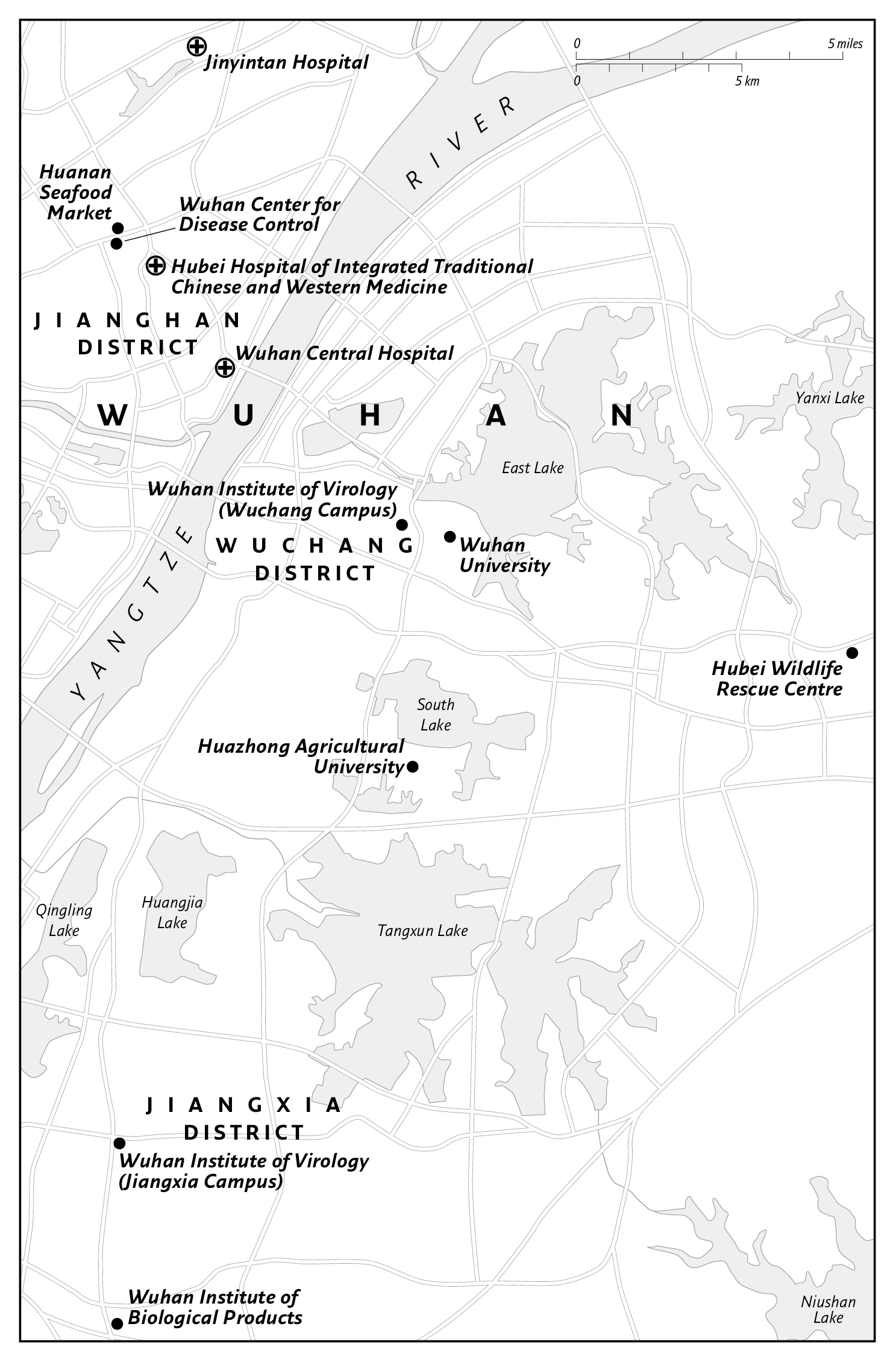
Prologue
The true laboratory is the mind, where behind illusions we uncover the laws of truth.
Sir Jagadish Chandra Bose
The authors of this book, Alina Chan, a scientist in the United States, and Matt Ridley, a science writer in the United Kingdom, have found ourselves inexorably drawn into the mystery of how the Covid-19 pandemic began. Over the past year, we have each pursued surprising revelations and rumours swirling around the origin of the virus. These took us deep into details of bats and SARS viruses in southern China, sick pangolins confiscated from smugglers, and cutting-edge gain-of-function virus research carried out in laboratories in Wuhan and elsewhere. In particular, Alinas life has been forever changed after plunging into the question of the origin of SARS-CoV-2, the causative agent of Covid-19, in May 2020. Her social media has since been transformed into an open forum where prominent scientists and internet sleuths spar, publicly, on the topic.
In April 2020 Matt wrote an essay for the Wall Street Journal about the viruss origin, headlined The Bats Behind the Pandemic, focused on the puzzling similarity of part of the SARS-CoV-2 genome to that of a virus from a pangolin a small ant eater while most of the genome resembled that of a bat virus. (A genome is the full genetic sequence of a creature.) He then read the preprint of a paper by Alina and two colleagues, Shing Hei Zhan and Ben Deverman, which came to the stark conclusion: Our observations suggest that by the time SARS-CoV-2 was first detected in late 2019, it was already pre-adapted to human transmission to an extent similar to late epidemic SARS-CoV. Noticing that Dr Zhan was an expert on genomic analysis and the other two were specialists in viral vector engineering at the elite Broad Institute of MIT and Harvard, Matt judged that this preprint a scientific paper yet to be peer-reviewed for publication was probably a careful and reputable study. It had come to an electrifying conclusion: the virus causing the pandemic was evolving more slowly than one newly arrived in the human species from another animal normally would. This implied it was already well adapted to human beings from the moment it was first detected in Wuhan in December 2019.
On 21 May 2020, Matt wrote to Gary Rosen, an editor at the Wall Street Journal, proposing an article to revisit the origin question, centred on the new paper: There is one new paper in particular that has really thrown the issue back into the melting pot, he wrote. A team of scientists finds that unlike SARS, this virus showed very little rapid adaptation/evolution in the early weeks of the epidemic, implying it was already settled into its final form. This implies that the source was almost certainly not via pangolins and probably not the wet market. It was more likely brought to the market by a person not an animal. So we dont know where it came from and that implies the source is still out there. Bad news.
The newspaper commissioned him to write the article, so he contacted Dr Zhan and sent him a series of questions to try to understand the implications of the work for the origin of the virus. Clearly, one of the ways that a virus could have become well adapted for humans, in the words of the papers title, was by having spent time in human cells or in a so-called humanised animal in the laboratory. Humanised animals, usually mice, have had their genomes altered to include a key human gene, in this case the entry receptor for certain SARS-related coronaviruses. At the time, a laboratory accident or leak still did not seem likely to Matt. He wrote to Dr Zhan: Id like to focus on the issue of the lack of an apparent adaptive period of rapid genetic substitution, and its implication that the virus had been circulating in human beings for longer than expected. (I am not focusing on the lab-leak possibility, though I will probably mention it among other possibilities.)
He received a lengthy, detailed and fascinating reply from Dr Zhans co-author, Alina. To Matts surprise, Alina did not pour cold water on his growing suspicions that a laboratory leak could not be ruled out. Indeed, she alerted him to a low-key announcement that week from the Chinese authorities that no animals in the Huanan seafood market in Wuhan had tested positive. This was consistent with the findings she and her colleagues reported in their paper that the market samples are genetically identical to human SARS-CoV-2 isolates and were therefore most likely from human sources. On 29 May 2020, the Wall Street Journal published Matts essay under the headline So Where Did This Virus Come From? The article began: New research has deepened, rather than dispelled, the mystery surrounding the origin of the coronavirus responsible for Covid-19. Bats, wildlife markets, possibly pangolins and perhaps laboratories may all have played some role, but the simple story of an animal in a market infected by a bat that then infected several human beings no longer looks credible.
Over the next several months, increasingly intrigued by the failure to turn up evidence of a chain of infections in a market, a village or anywhere else, Matt came to rely more and more on Alinas advice and insight as he pursued the story of the viruss origin. Eventually, he proposed that they join forces to write this book. By the time they finished writing it, because of the pandemic, they still had not met in person.
The importance of finding the origin of Covid-19
How the Covid-19 pandemic started may be the keenest mystery of our lifetime. The saga will forever punctuate the history of humanity. It has led to the deaths of millions of people, sickened hundreds of millions and dramatically changed the lives of almost every person on the planet. The impact of this invisible virus can also be measured in weddings and gatherings cancelled, jobs lost and businesses bankrupted, schools closed and parents balancing childcare and work, clinical visits missed and treatments put on hold, and innumerable people living more isolated lives than before. If we do not find out how this pandemic began, we are ill-equipped to know when, where and how the next pandemic may start.
Font size:
Interval:
Bookmark:
Similar books «Viral: The Search for the Origin of Covid-19»
Look at similar books to Viral: The Search for the Origin of Covid-19. We have selected literature similar in name and meaning in the hope of providing readers with more options to find new, interesting, not yet read works.
Discussion, reviews of the book Viral: The Search for the Origin of Covid-19 and just readers' own opinions. Leave your comments, write what you think about the work, its meaning or the main characters. Specify what exactly you liked and what you didn't like, and why you think so.

